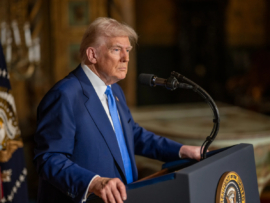
US President Donald Trump has met with the CEO of Intel, Lip-Bu Tan, and thinks his “success and rise is an amazing story.” He also described the meeting as a “very interesting one” and has scheduled more for the next week.
In a post on Truth Social, the president said that Tan and his Cabinet members will “bring (him) suggestions” following these discussions. While Trump didn’t specify the topics, the suggestions will likely focus on ways he and Intel can collaborate to bolster domestic chipmaking. A cash injection from the government would certainly help Intel boost its capacity and compete with its key Taiwanese rival, Taiwan Semiconductor Manufacturing Company (TSMC).
Intel confirmed in a statement that Trump and Tan had met “for a candid and constructive discussion on Intel’s commitment to strengthening US technology and manufacturing leadership” and that it “look(s) forward to working closely with him and his Administration.”
Trump has had a change of heart since calling for Tan’s resignation
Trump’s comments indicate a change of heart since last Thursday, when he called for Lip-Bu Tan to “resign immediately” because he is “highly conflicted” via a post on Truth Social. Such conflicts of interest were outlined in a letter by Arkansas Senator Tom Cotton the day before, who alleged Tan “has deep ties to the Chinese Communists.”
Tan, a US citizen born in Malaysia, became Intel’s CEO in March. Prior to this role, he was a venture capitalist and the CEO of Cadence Design Systems, a Silicon Valley-based software company that, in July, pleaded guilty to an export violation.
The plea agreement included a $140.6 million settlement after a Cadence subsidiary sold products to China’s National University of Defense Technology, violating US export restrictions. “These illegal activities occurred under Mr. Tan’s tenure,” Cotton wrote.
The senator further alleged Tan “controls dozens of Chinese companies and has a stake in hundreds of Chinese advanced-manufacturing and chip firms.” Tan’s venture capital work included investments in several Chinese tech companies.
At stake is Intel’s nearly $8 billion in federal funding under the CHIPS and Science Act. Cotton framed Tan’s résumé as a national security issue and asked Intel’s board to disclose any measures that might have been taken to address potential conflicts or require Tan to divest from foreign companies.
Tan penned an open letter to Intel staff after Cotton’s bombshell, maintaining he has “always operated within the highest legal and ethical standards” and is “engaging with the (US) Administration to address the matters that have been raised and ensure they have the facts.”
Intel also shared a statement confirming that the Board of Directors and Tan are “committed to advancing U.S. national and economic security interests and are making significant investments aligned with the President’s America First agenda.”
Trump wants to see Intel succeed
Once a dominant force in the chip industry, Intel has struggled amid the artificial intelligence boom. Unlike rivals that specialise in either chip design or manufacturing, Intel continues to operate in both sectors, a strategy that has left its fabrication efforts lagging behind TSMC.
In 2024, Intel’s stock declined by 60%, and the company fell from first to second place on Gartner’s list of top global semiconductor vendors by revenue growth. It was also its first unprofitable year since 1986, posting a net loss of $18.8 billion.
Then-CEO Pat Gelsinger, who led Intel for 30 years, departed after his turnaround plan — focused on funnelling money into new fabs and investing heavily in its legacy 18A chipmaking process — failed to deliver. He was replaced by Tan, who has a background in both chip design and manufacturing, and was expected to revamp Intel’s production strategy.
Some of Tan’s big moves have included pausing the construction of two advanced semiconductor plants in Ohio, cutting 15% of the workforce, revamping internal processes, and spinning off assets that don’t support his new mission. Unfortunately, it seems the plans to use 18A to produce its new “Panther Lake” laptop chips have not been successful, according to Reuters, and it is considering winding the process down.
There were also rumours that TSMC would take over some of Intel’s fabs, something that was reportedly encouraged by Trump, but these plans were being pushed by Intel board chairman Frank Yeary, according to the Wall Street Journal, and Tan never supported them. The CEO sees internal chip fabrication as essential for reducing the US’s reliance on foreign competitors like TSMC and Samsung.
Tan’s goals, therefore, ultimately align with the president’s, who has been heavily pushing domestic chip production through high import tariffs and tax breaks. Trump has recently started granting US firm NVIDIA licenses to sell its advanced AI chips to China, despite national security concerns.
Intel is reportedly considering reducing its emphasis on its main chipmaking process in an effort to better compete with rival TSMC and attract major clients, such as Apple and NVIDIA.





